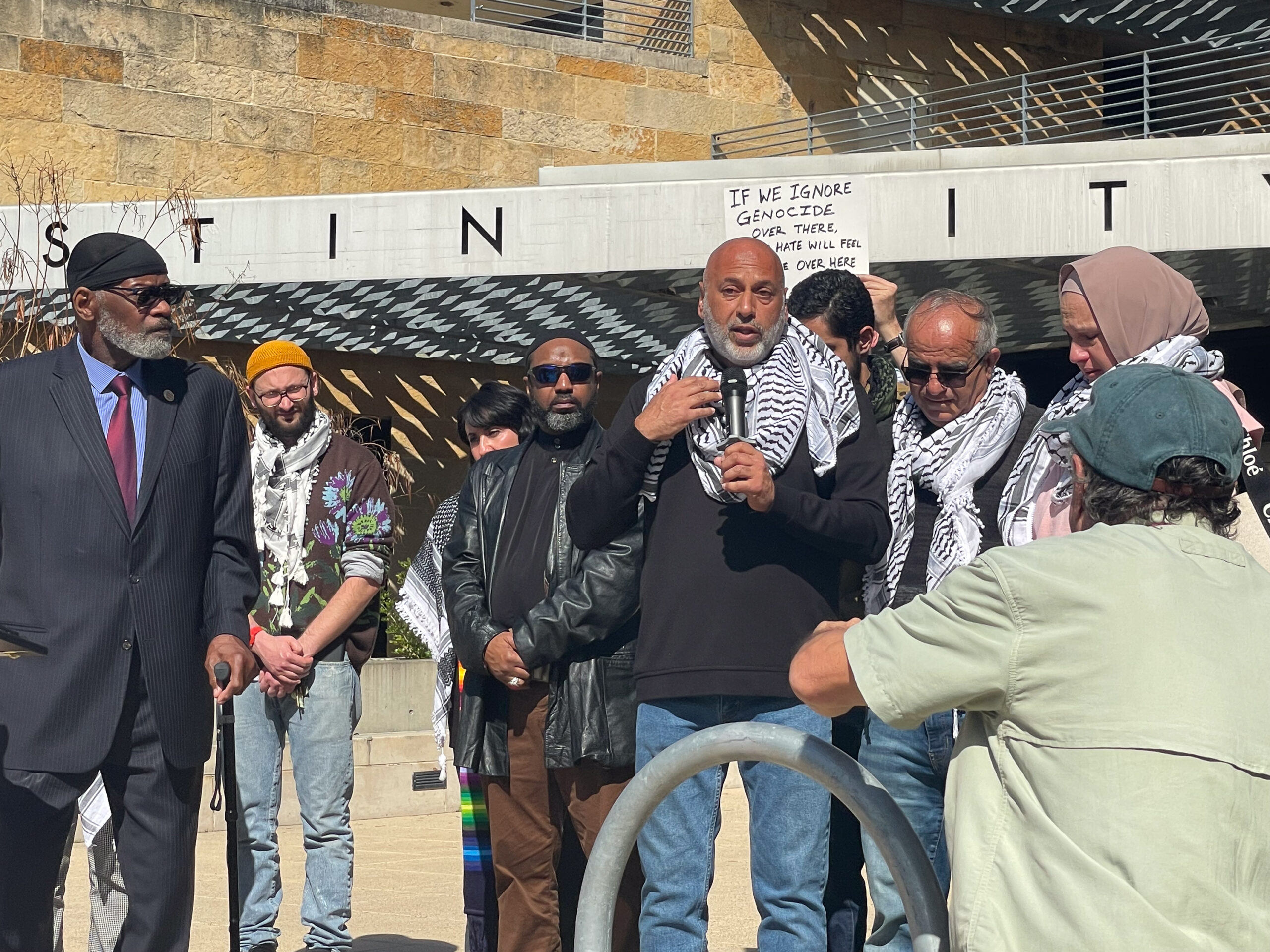Last week, police determined that the stabbing of 23-year-old Zacharia Doar on February 4 following his attendance at a pro-Palestine rally in Austin qualified as a hate crime. It’s now up to the Travis County District Attorney’s Office to decide whether to prosecute. In public responses to the crime, Austin’s elected leaders remain divided on how—and whether—to address the ongoing war in the Gaza Strip.
Around 7 p.m. on February 4, Bert James Baker, a 36-year-old Austin man described as “transient” in a heavily redacted police report obtained by the Texas Observer, approached a group of young men who were driving a 2019 Ford truck with a Palestinian keffiyeh displayed on a flagpole. The group had attended a large pro-Palestine rally in front of the Texas Capitol earlier that day. Witnesses say Baker spewed racist taunts at the men before allegedly attacking them and stabbing Doar in the chest with a knife. Austin Police Department (APD) officers arrested Baker on scene and filed charges for aggravated assault with a deadly weapon.
Austin Mayor Kirk Watson did not formally respond to the incident until three days later, after APD announced it had alerted the Travis County District Attorney’s Office that the incident fit the definition of a hate crime.

In a statement posted to Facebook and sent via his newsletter, Watson applauded the department’s assessment, then pivoted to address calls from locals urging the Austin City Council pass a resolution for a ceasefire in Gaza. Watson said debate over similar proposed resolutions in other cities has “devolved into division, shouting and recriminations.”
Watson continued: “The proposed resolution of the Austin City Council will not realistically end the violence on the other side of the globe. Nor will it stop federal taxes from being used to implement U.S. foreign policy. That is not in our power. The resolution, however, has the power to divide Austin — and will.”
Watson did not respond to requests for comment.
In a statement this week, the Austin for Palestine Coalition condemned Watson’s “belated response to the horrific hate crime and his bare dismissal of the ceasefire resolution.” Members of the coalition have argued that a ceasefire in Palestine is essential to stopping a rising tide of domestic hate crimes against American Arabs and Jews alike.
Residents of the state’s largest cities have urged local leaders to pass official resolutions calling for a ceasefire for months, as Israel’s attack on Palestinian territory has killed more than 27,000 since October 7—when Hamas, the militant group governing Gaza, killed 1,200 Israelis. A few Austin City Council members have expressed public support for a ceasefire resolution, but the city hasn’t taken any official action. A similar effort stalled in San Antonio early this year after Mayor Ron Nirenberg said tackling the global issue locally could be “reckless.” Houston leaders have held to their history of steering clear of official stances on international issues. In Dallas, leaders passed a resolution in support of Israel in October but have not taken any action in support of Gaza. The Austin for Palestine Coalition has called for residents to pack the February 15 Austin City Council meeting to continue calling for a ceasefire resolution.
Watson has not yet officially launched his bid for reelection in Austin’s upcoming mayoral race, but he has told reporters he intends to run. His opponents also vying for the seat have spoken out against last week’s attack but some have avoided taking a clear position on the issue of a local ceasefire resolution.

Former Austin City Council member Kathie Tovo, who announced her mayoral candidacy in January, posted on her social media last Tuesday saying she was “horrified by this violent act of hate.” She cited her status as a former member of the Hate Crimes Task Force, on which she sat as a council member.
In a comment to the Observer, Tovo said: “As a Council Member, I stood with Muslim neighbors at the Capitol in 2016 speaking out against Islamophobia; at the pandemic rally protesting hatred and violence toward Asian Americans; and with the Jewish community when hateful antisemitic literature appeared on doors in my district and throughout our city.”
On February 9, former Executive Director of Central Texas Interfaith Doug Greco, also running for mayor, said in an X post that APD’s recommendation of hate crime charges is “important not only in ensuring this crime is dealt with properly, but also in understanding causal factors to prevent these type of tragedies in the future.”
“We should all be calling for an immediate return of the hostages, for Palestinians and Israelis on both sides of the border to be protected, and a swift end to the conflict.”
Greco told the Observer, “We should all be calling for an immediate return of the hostages, for Palestinians and Israelis on both sides of the border to be protected, and a swift end to the conflict.”
Carmen Llanes Pulido, executive director of Go Austin/Vamos Austin (GAVA) and mayoral candidate, directly addressed Watson’s response in her own public statement. “Mayor Watson responded to this act of racially-motivated violence toward a Palestinian-American with an admonishment of the victim’s fellow protestors’ demands as ‘divisive,’ as if the call for a ceasefire resolution is to blame for a hate crime,” she wrote.
Llanes Pulido told the Observer she thinks the council should take up discussion of a ceasefire resolution and that she personally supports a ceasefire.
“It doesn’t directly impact municipal issues, but it is being asked for by members of the public and peacefully demonstrated around,” she said. “The disdain for that public process I see as symptomatic of a chronic disdain for public input and public process across issues.”







